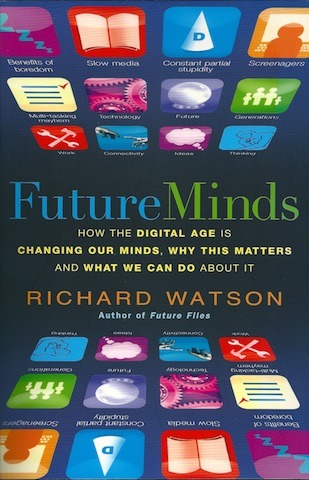Future Minds Summary
<1 min read ⌚
 How the Digital Age Is Changing Our Minds, Why This Matters and What We Can Do About It
How the Digital Age Is Changing Our Minds, Why This Matters and What We Can Do About It
It is a preconceived notion that technology creates changes only in our environment and is an external variable in our lives. The scientific truth is that the human brain is affected as much as everything else.
Contrary to the old belief that the brain stops changing once it matures, new evidence shows that it continues adapting and responding to the experiences it encounters. Cyberculture is just another one of them.
Who Should Read “Future Minds”? And Why?
As can be seen from above, this book is written by an author torn between the positive and the negative impacts of advancements in digital technologies.
On the one hand, he raises numerous red flags about the ways technology can impair the brain and dehumanize people, and on the other hand, he seems enthusiastic about the potential all these technologies bring.
“Future Minds” is an enjoyable read for readers interested in the values that define the human society, futurism, digital technologies, and cyberculture.
About Richard Watson
 Richard Watson is a British futurist, and author mostly focused on scenario planning and innovation. He has worked with Tesco, News Limited, Coca-Cola, The Department of Education, McDonald’s Virgin, IBM, Toyota, and others.
Richard Watson is a British futurist, and author mostly focused on scenario planning and innovation. He has worked with Tesco, News Limited, Coca-Cola, The Department of Education, McDonald’s Virgin, IBM, Toyota, and others.
“Future Minds Summary”
The new age creates new types of humans. People’s concentration patterns are changing, and as a result, notices disrupted thoughts and deep focus that is swapped with limited attention.
Reading habits have evolved as well; reading has become shallow scanning in search for valuable information, instead of the reflection method it once represented. Modern times ask for brief and easy to understand texts instead of pieces written in beautiful language.
Generations that grow in front of the screen look at the world through the eye of technology. Information is only a click away, so people stopped caring to remember facts and to gather knowledge, show low levels of patience and therefore have become strikingly shallow.
Even though the practice has demonstrated that technology brings a handful of positive changes in the educational system, too much technology can suffocate humanity. The brain has fewer and fewer problems to solve. It is no wonder that the world is worried.
Innovations and breakthroughs come only after continuous and focused thinking, and the modern human seems to be trying to do everything else besides that.
Artificial intelligence software notes a fascinating and rapid development. Available software is already capable of doing fundamental problem solving, and to some extent even decision making.
Futurists believe that the world will evolve into a place where humans are linked with technology in a way that will bring certain “digital immortality”. This idea of enhancing the human physical and mental capabilities with technological advancements may seem appealing, but one should not forget or underestimate the complexity of the human brain.
The parallel between the human mind and machines does just that; while emphasizing the processing speed and memory capacity of the human brain, less attention is given to the brain’s natural intelligence and how, combined with emotion, it creates different human experiences.
Conversely to technical advancements that try to minimize human effort and brain work, some technologies work in favor of understanding how the brain works. As time passes, more and more ways are found to assess which brain parts are involved with which activities.
Scientists make efforts to pinpoint how criminals’ brains function, and maybe find a way to stop or minimize crime.
Despite all the progress that is done in the field of new technologies, scientists still don’t seem to know how the human brain actually works.
Key Lessons from “Future Minds”
1. The three stages of Idea Generation
2. How to Generate Ideas
3. Protecting Humanity in the Digital Age
The three stages of Idea Generation
Ideas usually emerge from memory: existing and experienced concepts are linked in new ways. The idea generation process consists of three stages:
- Education stage in which the mind should be fed, and extensive reading and learning takes place
- Incubation stage is a stage where you put your subconscious to work, by letting yourself relax and lower the barriers that your conscience imposes
- Illumination in the form of a problem solution comes after the incubation stage, as a result of the gathered information and the ways the brain re-linked them, and it usually appears when least expected
How to Generate Ideas
Good ideas always come along with a package of wrong and irrelevant ideas. Good problem solvers let themselves free during the brainstorming process and only after they have numerous ideas to choose from – they start picking and eliminating.
Another critical point in this process is the need for stress reduction, which can be done through physical activities or committing to creating a time and space, especially for thinking.
Focused thinking, like all other things, is a deliberate practice, and it is vital for humans to push the brain to get used to these stress-free intervals before it can automatically get the job done.
Protecting Humanity in the Digital Age
The positive aspects and the convenience of emerging and advancing technologies is genuinely inviting and, simplifying tasks undermines the deliberate thinking process needed to be creative. Handheld devices and social media have created a parallel virtual reality that users can’t stay away from.
At the same time, people should be aware that many aspects of the human relationships cannot be mirrored online. Technological breakthroughs are a valuable and crucial part of human evolution, but only up to a point – until they don’t overtake humanity.
Like this summary? We’d Like to invite you to download our free 12 min app, for more amazing summaries and audiobooks.
“Future Minds” Quotes
If you want to have new ideas you need to go somewhere ideas can find you. Share on X Deep thinking is personally fulfilling. It is our deep thinking that makes us uniquely human. Share on X Clutter and creativity go together. Share on X Memory plays a key role in the generation of ideas. Share on X Screenagers have a predilection for multitasking and parallel processing. Share on XOur Critical Review
Using technology to enhance mental and physical functions and enjoying a more relaxed, more comfortable life may sound like a Utopian future, but Watson’s primary concern is that enchanted by the possibilities of problem-free life, people will fall into the trap that will ultimately kill the human spirit.
Emir is the Head of Marketing at 12min. In his spare time, he loves to meditate and play soccer.


 How the Digital Age Is Changing Our Minds, Why This Matters and What We Can Do About It
How the Digital Age Is Changing Our Minds, Why This Matters and What We Can Do About It




